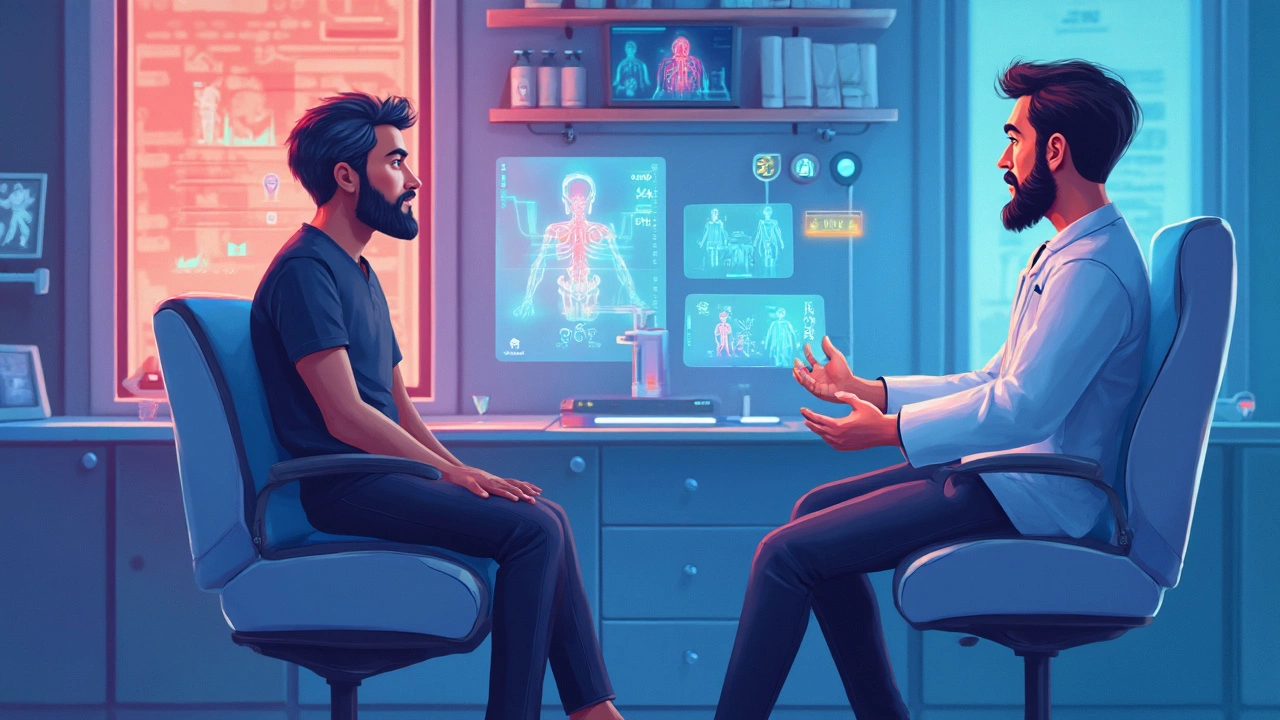 Feb, 12 2025
Feb, 12 2025
Ever find yourself wondering why you'd need to see your GP? Truth is, these visits are more than just obligatory health checks. Your GP is like your personal health detective, someone who knows you well and can spot changes before they balloon into bigger issues.
You might think of them as your go-to for when you’re under the weather, but they're crucial even when you're feeling on top of the world. They offer personalized healthcare that's hard to find elsewhere. From monitoring your long-term health trends to giving you tailored advice on lifestyle choices, they're there to help you navigate the tricky waters of maintaining good health.
So, when should you book that appointment? Is it just when you've got a nagging cough that won't quit? Regular check-ups can actually save you a lot of grief down the line, catching problems early or preventing them altogether. That's the real benefit of having a GP in your corner.
- Understanding the Role of a GP
- When to Schedule an Appointment
- Benefits of Regular GP Visits
- How to Find a GP Near You
Understanding the Role of a GP
The role of a GP, or general practitioner, is pretty extensive. They're often the first point of contact in the healthcare system. Whether it's a simple common cold or something that's nagging you after a while, your GP is there to help. They have a broad knowledge of various health issues and are trained to offer initial care and advice for a wide range of medical conditions.
One key thing is their ability to manage your overall health. Think of them as your personal health manager, who keeps track of your medical history to provide better guidance. They make sure that the pieces of information about your health are connected, offering a more comprehensive and holistic view of your well-being.
Prevention and Early Detection
Prevention is better than cure, right? Your GP plays a critical role here. They conduct routine check-ups that help catch possible health issues in their early stages. This includes screenings, vaccinations, and preventive care that could lead to early detection of chronic diseases. Regular visits based on your GP’s advice can really make a positive impact on your long-term health.
Coordinating Specialist Care
It's not all about what your GP can do in their own practice. If you need more specialized attention, they can refer you to the right specialists. They coordinate with hospitals and other health services to make sure you receive comprehensive care. Think of them as the quarterbacks of your healthcare, leading the team to better results.
Providing Ongoing Treatment
For those with chronic conditions, GPs help manage ongoing treatment plans. They ensure you get the right medication dosages and help monitor the effectiveness of your treatments, making adjustments as needed. They act as a bridge between you and your health needs, so you always have someone watching your back.
Here’s a quick look at some statistics:
| Role | Percentage of Time |
|---|---|
| Patient consultations | 50% |
| Administrative tasks | 30% |
| Continuing education | 20% |
Understanding your GP’s role isn't just about knowing when to see them; it's knowing how they fit into the bigger picture of your health. They aren't just doctors; they're your health partners.
When to Schedule an Appointment
Deciding when to book an appointment with your GP can sometimes feel like a guessing game, but it doesn't have to be. There are some straightforward rules of thumb that can make the decision much easier.
Regular Check-ups
It’s a smart move to see your general practitioner for a regular check-up at least once a year. These visits aren't just for ticking a box; they help keep your health on track and catch anything unusual early. Think of it as a health MOT.
Persistent Symptoms
If you've got symptoms that just won't quit—like a cough lasting more than a few weeks, persistent headaches, or unexplained weight changes—it's time to see your GP. They can help figure out what's going on and get you back to feeling your best.
Managing Chronic Conditions
If you have a chronic condition, these appointments are even more critical. For instance, if you're dealing with diabetes or high blood pressure, regular GP visits help manage and monitor your condition effectively, preventing complications down the line.
Keeps for Mental Health
Your mental health is just as important as your physical health. If you're struggling with depression, anxiety, or stress, your GP is a great first line of support to explore treatment options or referrals to specialists.
| Reason | Frequency |
|---|---|
| Annual Check-up | Once a year |
| Chronic Conditions | As advised by GP |
| Unusual Symptoms | When needed |
| Mental Health Concerns | When needed |
Keeping these points in mind can help you decide when it’s time to call your local doctor and schedule an appointment. It’s always better to catch things early or have peace of mind rather than ignoring your health.

Benefits of Regular GP Visits
Think of regular visits to your GP as a maintenance check for your body. Here’s why they matter so much:
Prevention is Better Than Cure
When you visit your general practitioner regularly, you get an expert eye looking over your health. They can spot potential issues before they become big problems. Things like high blood pressure or cholesterol are silent threats that, if caught early, can be managed easily.
Managing Chronic Conditions
If you have a condition like diabetes or asthma, your local doctor plays a key role in keeping things in check. They’ll help tweak your treatments and give you advice on how to live better day by day. It’s not just about prescriptions; it’s about holistic health guidance.
Building a Health History
Your GP keeps track of your medical history, which helps provide care that’s tailored just for you. It's like having a personalized medical diary that aids in faster, more accurate treatment decisions when you need them most.
Access to Specialist Services
Need a specialist? Guess who’s got your back? Your local GP knows the best routes for referrals, ensuring you get to the right professional for specific health concerns, without getting lost in the healthcare maze.
Cost-Effective Healthcare
It might surprise you, but regular GP visits can save money in the long run. Preventive care and early treatment can keep you from costly emergency visits or hospital stays. It’s about investing in your health proactively.
Feeling unsure about whether to book that GP appointment? Remember, it’s not just about fixing what’s broken but keeping everything running smoothly in the first place.
How to Find a GP Near You
So, you've decided it's time to get a GP on your side, but where do you start? Finding a local doctor isn't as daunting as it might seem. There are a few straightforward steps that can help you locate the right general practitioner for your needs.
Check Online Directories
Begin your search online; there are plenty of directories dedicated to helping you find a GP near you. Websites like the National Health Service (NHS) or even Google Maps can point you in the right direction. These platforms often provide reviews and ratings, giving you a snapshot of other patient experiences.
Consult Your Health Insurance
If you have health insurance, that's a great resource. Most insurers offer lists of in-network GPs, ensuring that your visits are covered. You can usually access this information through their website or a quick call to customer service.
Ask Friends and Family
Sometimes, a personal recommendation can make all the difference. Talk to friends, family, or colleagues about their experiences with their local doctors. Real-life feedback can give you insights into a GP's bedside manner, expertise, and reliability.
Visit and Evaluate
Once you've shortlisted a few options, consider visiting their offices. This lets you gauge the environment and interaction with staff. Pay attention to factors like location, office hours, and the overall vibe—important when selecting a place you'll visit often.
| Criteria | Consideration |
|---|---|
| Location | Convenient and accessible |
| Office Hours | Fits your schedule |
| Insurance | Accepted by your plan |
| Reviews | Positive patient feedback |
Considering these factors can lead you to a GP who matches your personal and medical needs well. With the right doctor, you're not only ensuring better health but also peace of mind knowing someone's got your back.
